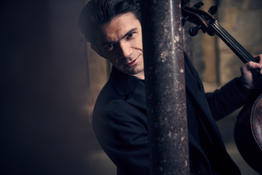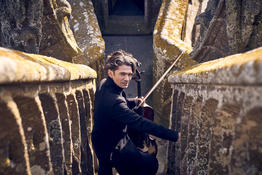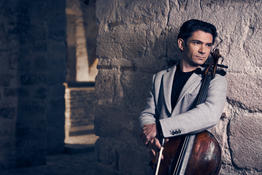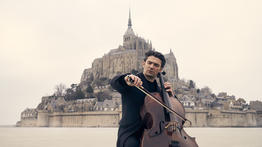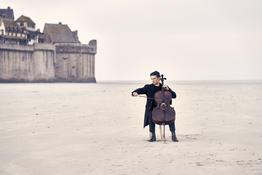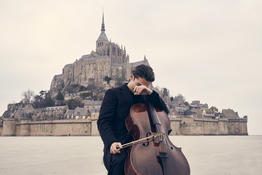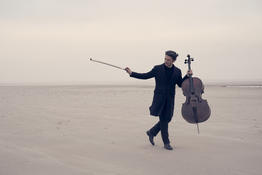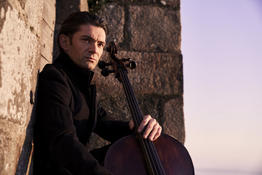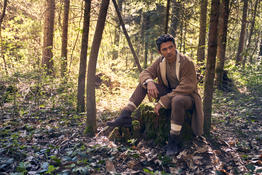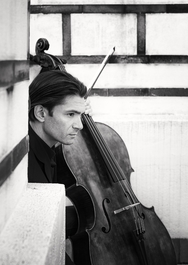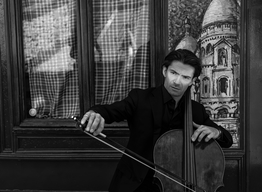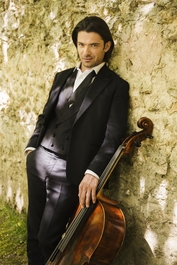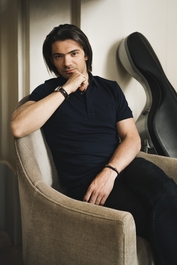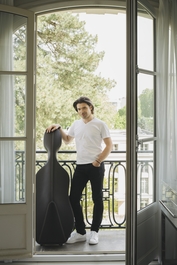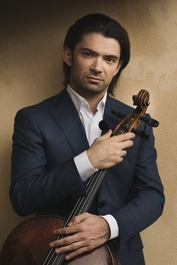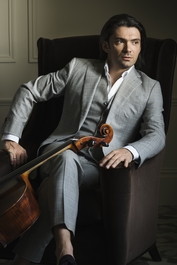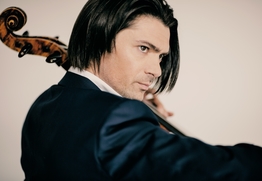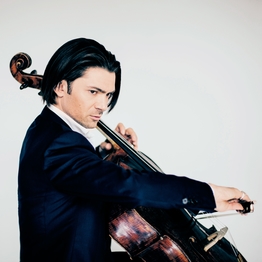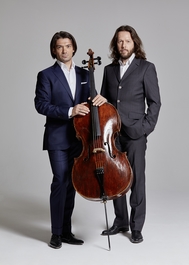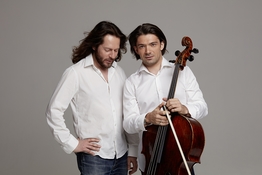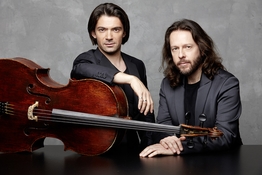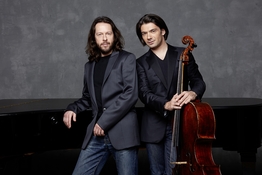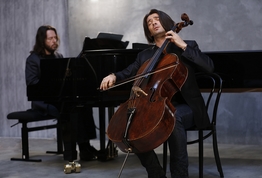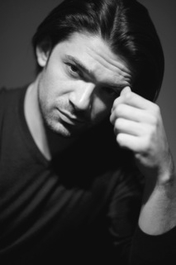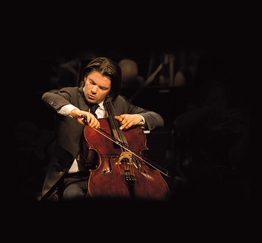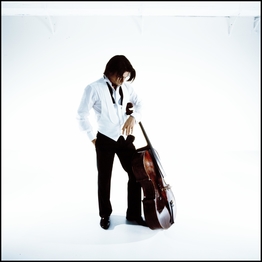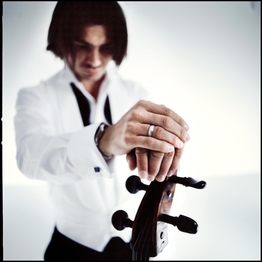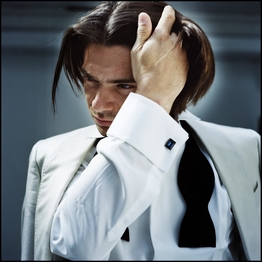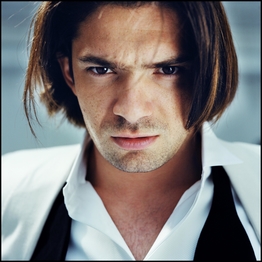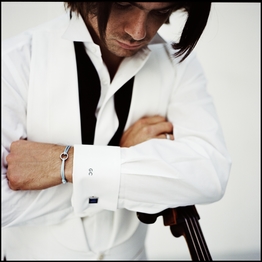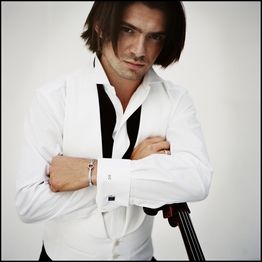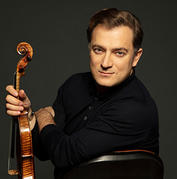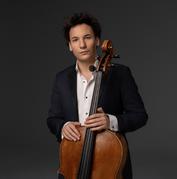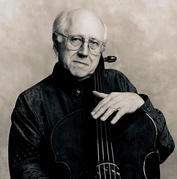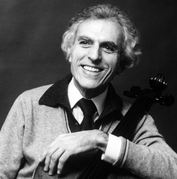Gautier Capuçon
News
Souvenirs
Cellist Gautier Capucon celebrates his fortieth birthday this year – thirty-five years of which have been spent with his cello. His forthcoming release is a three disc album titled Souvenirs which reflects on his worldwide success over the past 20 years, celebrating the many significant collaborations and recordings made during that time. Souvenirs comprises new and old, live and studio recordings which serve as souvenirs of the cellists career and artistry.
New recordings include Bach's First Suite, Kodaly’s monumental Sonata, and Dutilleux’ Three Stanzas on the Name of Sacher recorded at the Philharmonie de Paris in November 2020. In addition Souvenir’s includes the solo, concerto, chamber music and great classical cello sonata repertoire with pianist partners Martha Argerich (2002), Michel Dalberto, Frank Braley, and most recently with Yuja Wang in 2019.
A sense of community is at the core of the Gautier’s raison d’être, saying “It's up to us to reach out to people, to inspire feelings of joy.” During lockdown 2020 Gautier challenged himself to meet daily with his followers on social media fulfilling his audiences’ need for live music. (56 days in total) After lockdown, Capuçon set out on his own Tour de France that invited audiences to meet him in village squares, music schools, and other unusual places, driven by his passion to simply share music. This was not the first time, the cellist brought music and its inherent joy to inspire the wider public. He performed in the general tributes after the death of French rockstar Johnny Halliday and in 2019, Gautier played spontaneously outdoors in front of Notre-Dame Cathedral in Paris while its embers were still burning.
From the age of five he dazzled his teachers with his musicality, his ease, his perseverance, perhaps even stubbornness. His international career evolved naturally at the end of his teenage years when, armed with prestigious international awards, he began to perform with fellow chamber musicians of the calibre of Daniel Barenboim, Stephen Kovacevich, Nicholas Angelich, Hélène Grimaud, Yuja Wang, Katia and Marielle Labèque, and conductors such as Valery Gergiev, Paavo Järvi, Myung-Whun Chung and Bernard Haitink.
His teachers themselves join in praising his musicality – and this from an early age. Philippe Muller at the Paris National Conservatoire as well as Heinrich Schiff were among the famous pedagogues who nurture Gautiers prodigious talent saying of Gautier’s success:
“A career as a soloist requires – beyond exceptional talent – intense work that never completely eases off…what a pleasure it is to admire it, to enjoy its fruit, or simply to bask in its shade! Your success has repaid what I was able to give you a hundred times over.”
Beguiling Beethoven recordings to look forward to in February
The chamber-music partnership of Renaud Capuçon, Gautier Capuçon and Frank Braley is well established, and their Erato catalogue already includes piano trios by Schubert and Ravel. The former brought this response from BBC Music Magazine: “The playing is superb from just every angle you consider it: beguiling tone, lovely intelligent phrasing, strong but flexible rhythmic articulation, precise pitch and alert ensemble.”
When the Capuçon brothers and Braley performed Beethoven’s ‘Archduke’ Trio, op 97 at London’s Wigmore Hall in 2011, the Guardian wrote: “Together, all three musicians have the quality that is the most priceless of all in playing chamber music – they listen intently to each other and always take note of what they do. Their account of the Archduke Trio was less imposingly grand than some, almost intimately conversational at times, without any details over-emphasised. It still had a tremendous sense of organic coherence, as if carved from a single creative block, with its heart firmly located in the great set of variations that form the slow movement.”
Beethoven dedicated the ‘Archduke’ – a grandly conceived, but engaging work that was first performed in 1814 –to his patron (and composition student) Archduke Rudolf of Austria. The ’Ghost’ trio, op 70 No 1, takes its nickname from its central slow movement, with its mysterious and uncanny atmosphere. First heard in late 1808, it dates from the same period as the Symphonies Nos 5 and 6.
Gautier Capuçon and Yuja Wang partner up to record Chopin and Franck
“Finesse and fire from a starry musical duo … A recital that showcased the very best in collaborative music-making,” was how the Toronto Star described the concert at Koerner Hall in Toronto that formed the basis for this recording.
It was part of an extensive North American tour made in Spring 2019 by cellist Gautier Capuçon and pianist Yuja Wang, who established their musical partnership several years ago, notably consolidating it with performances at the Verbier Festival in Switzerland. “[They] had worked their interpretations into perfect unity,” continued the Toronto Star. “They both possess remarkable technique: Wang with her seemingly impossible legato runs and fingers that endlessly spin the most luxurious of musical silk; Capuçon with his graceful phrasing supported by seemingly infinite gradations of bow control.”
When their tour took them to Boston, The Classical Review observed that “Capuçon and Wang share a similar vigor and alert spontaneity that make it seem as if they are finishing each other’s phrases. The French cellist plays with a robust intensity that brings out drama from even the most delicate of works ... Wang proved a subtle and thoughtful partner … It seemed that the two had been playing together for a lifetime.”
The programme for the album comprises two works by Chopin, his Sonata in A Major and his Polonaise brillante in C Major, and Franck’s Sonata in A Major, a transcription by the 19th century cellist Jules Delsart of the Belgian composer’s glorious violin sonata.
“The two sonatas, very different in character, gave the duo an excuse to explore the softer side of virtuosity,” observed the Toronto Star. “Together, they frequently made the music whisper without losing any of its engaging tone. The pianissimo playing drew our attention into a rapt, tight circle around the stage lights.”
The sheer excitement generated by the duo’s music-making was captured in The Philadelphia Inquirer’s report after Wang and Capuçon appeared in the City of Brotherly Love: “As battles of the titans go, the … recital was a rare thrill. Capuçon has a gorgeously complex sound in the low, quiet parts of his voice. He is refined and so smoothly nimble you never sense a drop of struggle …The term accompanist has never done a very good job of describing the relationship between pianist and instrumentalist in any piece. But as essentially a keyboard composer, Chopin brought absolute egalitarianism to the party, and a party it was ... Wang — a star locally since her Curtis days [Curtis Institute, Philadelphia’s prestigious conservatory] and a superstar everywhere else since — is a pianist worth hearing because of her strong personality, and it was there in abundance. In the Chopin Cello Sonata, Opus 65, she found ideas and musical lines to underscore in boldface. So excitable was the last movement you felt you were in the throes of some weather phenomenon. She digs into moments of arrival, releasing a deep sense of satisfaction … Chopin’s Introduction and Polonaise brillante … was pure adrenaline.”
Sabine Devieilhe wins big at the 2018 Victoires de la Musique Classique
Warner Classics & Erato artists were out in full force at the 2018 Victoires de la Musique Classique on Friday in Evian, France. French coloratura soprano Sabine Devieilhe dominated the Victoires this year in its 25th-anniversary edition, winning two of the seven awards, and both categories in which she was nominated.
Not only was she crowned Artiste Lyrique de l’Année (Opera Singer of the Year); she also claimed Album of the Year for her French opera recital Mirages, along with Les Siècles orchestra and conductor François-Xavier Roth.
In 2013 Devieilhe received the Opera Singer 'Revelation' of the Year at the 20th Victoires de la Musique; the same year she signed an exclusive recording contract with Erato.
'Since the beginning I’ve cherished this album and wanted to record it even early on in my singing career. I’ve always appreciated this French music which seems so beautifully aligned with my voice. François-Xavier Roth is an exceptional conductor who defends this repertoire with admirable fervor. Thank you to the magnificent performers on the album, Les Siècles, Alexandre Tharaud, Marianne Crebassa, and to Alain Lanceron at Warner Classics and Erato for his trust and support throughout all our recording adventures.’ She also thanked her family for supporting her in a demanding yet richly rewarding career choice.
To a live televised audience of 1.3 million viewers on France 3, Devieilhe sang the opening aria from the album: André Messager’s sumptuously romantic ‘Le jour sous le soleil béni’ from the little-known operetta Madame Chrysanthème.
Equally celebrated at the ceremony was legendary soprano Angela Gheorghiu, who accepted the Victoire d’Honneur for Oustanding Achievement and performed ‘Un bel dì, vedremo’ from Puccini’s Madama Butterfly, accompanied by the Orchestre de l’Opéra National de Lyon and conductor Pierre Bleuse. The accolade comes just months after Gheorghiu’s highly anticipated return to the recording studio for her new album of Italian verismo arias, Eternamente.
Other standout performances on French classical music’s night of nights included cellist Gautier Capuçon’s The Swan, from his new album Intuition (he was also nominated for Instrumental Artist of the Year), and Polish countertenor Jakub Józef Orliński with Italian Baroque orchestra Il pomo d’oro for Vivaldi’s Vedrò con mio diletto. Recently signed to Erato, Orliński has recorded his solo album debut with Il pomo d’oro for release later this year.
Congratulations to all the nominees, winners and performers at the 2018 Victoires de la Musique Classique!
Diana Damrau, Bryan Hymel & brothers Capuçon to perform under the Eiffel Tower
- Berlioz – La Damnation de Faust : Marche Hongroise / Orchestre seul
- Puccini – Gianni Schicchi « O mio babbino caro » / Nadine Sierra
- Verdi – Rigoletto « La donna è mobile » / Bryan Hymel
- Prokofiev – Roméo et Juliette « Danse des Chevaliers » / Orchestre seul
- Mozart - Don Giovanni « Deh vieni alla finestra » / Ludovic Tézier
- Mozart - Don Giovanni « Fin ch’han dal vino » / Ludovic Tézier
- Gounod – Roméo & Juliette : « Je veux vivre» / Diana Damrau
- Rimsky-Korsakov – La Fiancée du Tsar « La chanson du houblon» / Orchestre + chœur
- Gounod – Sapho « O ma lyre immortelle » / Anita Rachvelishvili
- Brahms – double concerto « Vivace non troppo (3ème mvt) » / G.& R. Capuçon
- Kabalevsky / A. Cottee – «Bonne Nuit» / Maîtrise de RF
- Leoncavallo – Pagliacci «Vesti la Giubba » / Bryan Hymel
- Chostakovitch – Suite de Jazz n°2 « Valse n°2 » / Orchestre seul
- Delibes – Lakmé «Duo des fleurs » / Nadine Sierra + Anita Rachvelishvili
- R. Strauss – Morgen / D. Damrau + R. Capuçon
- Vangelis / Don Rose – « Les Chariots de feu »(version pour piano et orchestre ) / Orchestre seul
- Puccini – La Bohème « O soave fanciulla » / Nadine Sierra + Bryan Hymel
- Moussorgsky / Ravel – Les Tableaux d’une exposition « la grande porte de Kiev » / Orchestre seul
- Verdi – Don Carlo «E lui !... desso ! ...» / B.Hymel + L.Tézier + Choeur RF
- Bizet - Carmen «Les voici la quadrille ! » / Orchestre + chœur + Maîtrise
- Berlioz/ Rouget de Lisle – La Marseillaise (couplet n°1 * 2)
Diana Damrau : soprano
Nadine Sierra : soprano
Anita Rachvelishvili : mezzo-soprano
Bryan Hymel : tenor
Ludovic Tézier : baritone
Renaud Capuçon : violin
Gautier Capuçon : cello
Maîtrise de Radio France Chœur de Radio France
Sofi Jeannin : choral direction
Orchestre National de France
Valery Gergiev : direction
Christian Knapp : chief assistant
Gautier Capuçon launches new Beethoven album at the Philharmonie de Paris
French cellist Gautier Capuçon and pianist Frank Braley launch their monumental double album devoted to Beethoven's complete Cello Sonatas with a concert on 18 October at Paris' prestigious new Philharmonie concert hall, which also hosts an immense Beethoven exhibition this season.
In their much-anticipated concert, Capuçon and Braley offer insight into Beethoven’s rich output for cello and piano: three out of the five sonatas from the album, as well as the variations based on The Magic Flute (also recorded for this release).
Gautier Capuçon's new Beethoven album is out now.
Gautier Capuçon records the complete Beethoven Cello Sonatas with Frank Braley
“A recording of the complete Beethoven sonatas for cello and piano is an important landmark in a cellist’s musical life,” says Gautier Capuçon. “These sonatas have been part of me since I was very young and I was waiting for the right moment to record them, the moment when I felt ready to do so.
“Frank Braley was the ideal partner for this. We’ve known each other well for a long time and we’ve performed and recorded lots of different of repertoire together. We’ve been playing the Beethoven sonatas together for years and it made perfect sense for us to record them now.
“Frank is more than a musical partner. Over the years he has become a real friend, someone I can enjoy making music with and working with on a tour, but he’s also someone I can spend hours talking to, giving us the chance to really get to know each other. This sense of closeness and familiarity comes through when we play music together.
“We were lucky enough to make this recording in a corner of paradise, a place unlike any other, one of the most peaceful and inspiring in the world: Schloss Elmau in Bavaria. This haven of peace, which has welcomed so many artists over the decades, was an extraordinary place to explore the essence of Beethoven’s music under ideal conditions.”
Beethoven wrote these five sonatas for cello and piano over a period of nearly 20 years – in 1796, 1808 and 1815 – and they can be said to represent the three creative periods of his life: early, middle and late. Also included in this double album are three sets of variations, dating from 1796 and 1801, which Beethoven composed on themes from Handel’s Judas Maccabeus and Mozart’s Die Zauberflöte.
Gautier Capuçon’s substantial catalogue of recordings on Warner Classics already documents his musical partnership with Frank Braley, which includes albums of chamber music by Schubert and Ravel – also featuring Gautier’s violinist brother Renaud (who also chose Braley as his partner when he recorded the complete Beethoven violin sonatas for Erato) – and Arpeggione, a duo album of works by Schubert, Debussy, Britten and Schumann. The reception for Arpeggione bore witness to their outstanding collaboration: “This recording is an accomplishment in both duo playing and musical insight, and everything on it is unforced and unfussy, but perfectly idiomatic in its own way...” wrote Gramophone, while MusicWeb International opined: “I heartily commend this disc for all lovers of cello/piano music. Capuçon and Braley give superb performances.”
Gautier Capuçon's new double album with pianist Frank Braley, Beethoven Complete Cello Sonatas and Variations, is out in October.
Artist tributes flowing in for Martha Argerich on her 75th birthday
Dear Martha,
Thank you for the great experience of making music together. It has been a privilege and a pleasure to play with you. Your great artistry was my 70th birthday present. But since now you are celebrating yours, may I wish you a very very happy and healthy birthday and many happy returns.
See you soon,
-Itzhak Perlman
My dearest Martula,
Meeting you has had a huge impact in my life – a personal, emotional and musical impact.
I was so immensely lucky to meet you – this great, fiery pianist; this living legend, this goddess of music and above all this extraordinary woman – free-spirited, passionate, curious and sensitive.
I was so excited to play with you for the first time – the Mendelssohn Piano Trio – and yet at the same time blown away, even intimidated; this young cellist fresh out of the Conservatoire suddenly face to face with a classical music giant. I will never forget the kindness with which you looked at me, and the trust you placed in me. You led me by the hand on stage with infectious energy and tenderness.
Everything I’ve experienced on stage with you and in life is invaluable. The first wild years at Lugano, the frenzy around the Gulda homage in Japan, the Beethoven Triple Concerto...
Today I’d like to tell you, once again, MERCI.
Thank you for who you are.
Thank you for your sincerity and fidelity.
Thank you for all the love you give your fellow musicians and friends.
-Gautier Capuçon
Martha Argerich has in many ways been my teacher because I have conducted my debuts with her of the Schumann Piano Concerto, the Liszt E-Flat, Prokofiev's Third Piano Concerto, Tchaikovsky No.1 and Beethoven No.1. Needless to say, once you have performed these concertos with her, it is almost impossible to imagine them played another way, such is her originality, fire, and sophistication.
May she continue to wow us all with her bewitching yet oh-so-natural way with music, and to continue offering her enormous wisdom to the younger generation of musicians...And to those of us who are not so young! -Sir Antonio Pappano
Since I listened to her playing for the very first time I immediately fell in love with her incomparable way of making music. The way she preformed evoked emotions in me that I had never felt before. I was so overwhelmed by her great naturalness, her unfailing musical instinct and her incredible virtuosity and strength that it became one of my biggest dreams to meet her in person some day and maybe even to be able to play for her.
After a couple of years, in 2010, this dream actually came true thanks to a great coincidence: at a small summer festival in Italy my great idol actually let me play for her in her practice room. Everything changed for me. From that day on Martha Argerich became my musical mentor, supported me generously and, above all, a close personal friendship started to grow between us.
Whenever she comes to visit me in Munich now and we sit together to talk and joke about music and life, these are the most inspiring and beautiful hours for me.
I am unbelievably thankful and happy to have her, for me she is the one and only; she is my 'piano mama'!
Thank you, Martula, for existing and for enriching our lives with your wonderful art. All the very best for your birthday from the bottom of my heart! Tantissimi auguroni!
-Sophie Pacini
Martha was always was my idol from childhood, and I still remember the moment I met her in Milan for the first time.
Since then I feel in love not only in her playing which is beyond any imagination, but also immense admiration for her warm, motherly and caring personality.
Sometimes I feel guilty that she does care for me so much and I have nothing to offer her...And I have to confess that getting to know her is the best thing ever happened in my life.
Happy birthday, Martha! I love you so much!
If I think to Martha Argerich one word comes immediately to my mind: immortality. Immortality because, with her overwhelming energy, she has been able to stop time and write incredible pages in the history of pianism. Best wishes, Martha! -Beatrice Rana
The Guardian Album of the Week: Martha Argerich's latest offering from Lugano
"The releases of recordings from the Progetto Martha Argerich, the festival over which the great lady presides each June in the Swiss resort of Lugano, have become one of the most reliable annual fixtures in the CD calendar," declares The Guardian in a four-star review of the latest three-album edition of Martha Argerich and Friends: Live from Lugano, out now.
The latest offering features Argerich live in concert with regular and longstanding duo-partners (Stephen Kovacevich, Ilya Gringolts, Gautier Capuçon, Nicholas Angelich) and a new generation of artists she has personally mentored. The delightfully eclectic repertoire across the festival ranges from Brahms to Ginastera to Philip Glass.
"Argerich fans are always looking for additions to her personal discography, too, and they get a couple here. She joins Lilya Zilberstein in Debussy’s two-piano arrangement of Schumann’s Six Canonic Studies Op 56, originally written for pedal piano; and with Eduardo Hubert as the other soloist and the Orchestra della Svizzera Italiana under Alexander Vedernikov, she takes on Porteña (Latitude 34° 36° 30°), for two pianos and orchestra."
It is equally fascinating to hear Argerich and her close collaborators revisit music they have explored together previously. On this album she and Kovacevich give "a rather stormy, fierce account of Debussy’s En Blanc et Noir, a work they recorded together in the 1970s."
The Guardian's verdict: "There is still the sense of occasion and uniqueness that you seem to get with everything that comes out of these Lugano gatherings."
Martha Argerich & Friends: Live from Lugano 2015 is out 13 May, 2016.
Quatuor Ebène: "Matthias Goerne is a singer who can walk on water."
The Ebène Quartet's new Schubert album traces the links between Schubert's instrumental chamber music and his mastery of song, placing the monumental String Quintet D956 (guest cellist Gautier Capuçon) alongside five lieder, including the transcendent Death and the Maiden, all in world-premiere arrangements for baritone and strings by the Ebène's cellist Raphaël Merlin.
"He is not only a gifted cellist, but a fantastic arranger and composer," said baritone Matthias Goerne of Merlin. "I have to say it's so astonishing. You have even more possibilities with the strings compared to the original versions."
The admiration was mutual: "Matthias is the king of baritones!" says violinist Pierre Colombet.
"It was a huge privilege for us to have Matthias Goerne sing these arrangements. He is a singer who can walk on water," enthused the Quartet.
Quatuor Ebène's Schubert album, featuring Matthias Goerne, Gautier Capuçon and double bassist Laurèn Durantel, is out now.
Related releases














Upcoming Concerts
Tuesday
Wednesday
Friday
Saturday
Thursday
